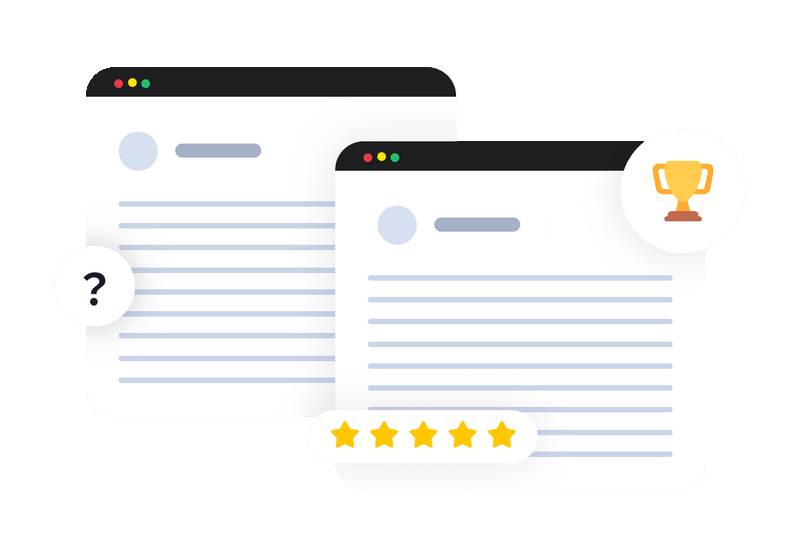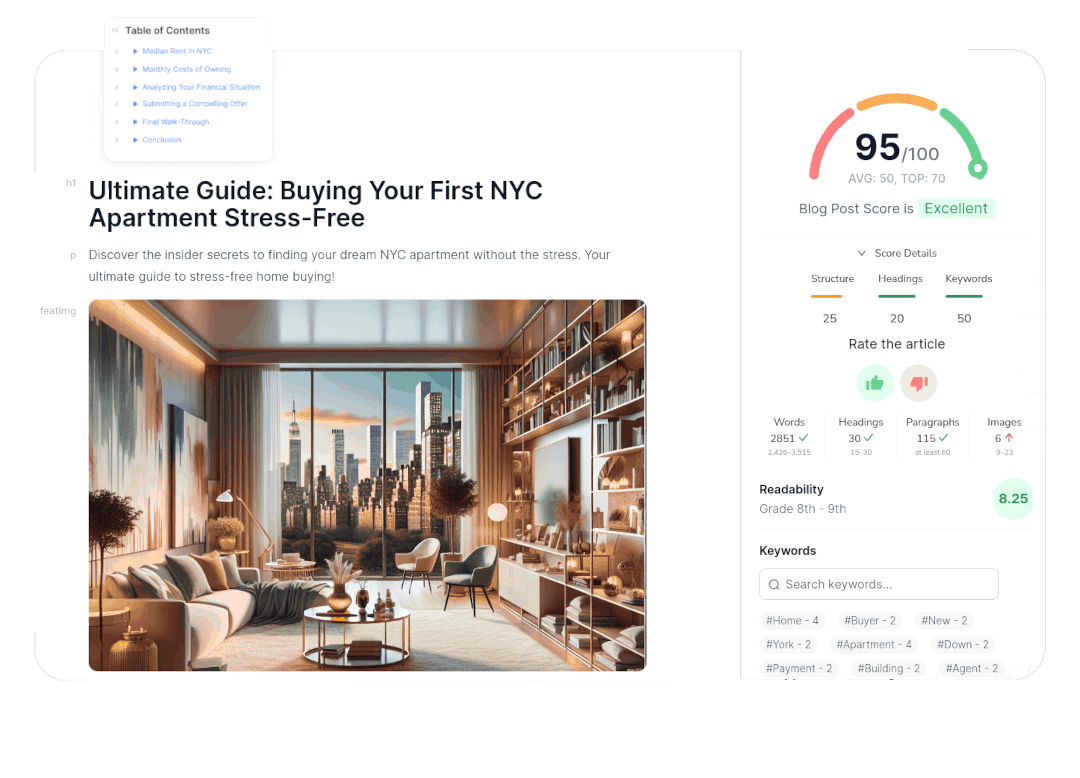SaaS Product Comparison
Comparison Claude and ChatGPT
This page provides a detailed comparison of Claude and ChatGPT, two prominent AI-powered writing assistants. We’ll delve into their functionality, key features, ideal users, advantages, disadvantages, pricing, user feedback, and potential gaps in their capabilities. Our goal is to offer you a comprehensive and balanced analysis to help you make an informed decision.
Claude
Developed by Anthropic PBC, Claude is a next-generation AI assistant designed to be helpful, honest, and harmless. Accessible through a chat interface and API, Claude excels at various conversational and text processing tasks. It’s known for its high reliability and predictability, making it a valuable tool for a wide range of users.
Claude: Overview
Claude is an AI assistant developed by Anthropic, a company focused on creating AI systems that are helpful, honest, and harmless. Its advanced language model enables it to engage in natural-sounding conversations and perform various text processing tasks like summarization, search, creative writing, Q&A, and coding.

Claude: What It Does
- Conversational AI: Claude excels at engaging in natural-sounding conversations, answering questions, and providing insightful responses.
- Text Generation: Claude can generate various types of text, including stories, articles, poems, summaries, and even code.
- Summarization: Quickly extract key points from long articles or documents, providing concise summaries.
- Search: Claude can assist with information retrieval, providing relevant results based on your queries.
- Coding: Claude can assist with coding tasks, generating code snippets and helping with debugging.
Key Features of Claude
- Constitutional AI: Claude is trained on a set of ethical principles, reducing the risk of generating harmful or biased outputs.
- Large Context Windows: Claude can process large amounts of text, making it suitable for complex tasks involving extensive input.
- Personality Customization: Users can adjust Claude’s personality, tone, and behavior to fit their specific needs.
- API Access: Claude’s API allows developers to integrate its capabilities into their applications.
- Secure Data Handling: Claude prioritizes data security, with strict data retention policies and no training on user data.
Who is Claude For?
Claude is well-suited for a broad range of users, including:
- Writers: Generate creative content, brainstorm ideas, and refine existing writing.
- Researchers: Summarize research papers, find relevant information, and ask questions about complex topics.
- Students: Get help with homework, research, and writing assignments.
- Business Professionals: Automate tasks, generate reports, and improve communication.
- Developers: Integrate Claude’s AI capabilities into their applications.
Pros of Claude
- Harmless and Ethical: Claude is designed to be safe and ethical, minimizing the risk of generating harmful or biased outputs.
- Reliable and Predictable: Its high level of reliability and predictability makes it a dependable tool for various tasks.
- Conversational and Human-like: Claude excels at engaging in natural-sounding conversations, making it enjoyable to interact with.
- Versatile Functionality: Claude offers a wide range of capabilities, including text generation, summarization, search, and coding.
- Strong Security Measures: Data security is a priority, with strict data retention policies and no training on user data.
Cons of Claude
- Limited Availability: Claude is currently in limited beta, so it’s not yet widely accessible.
- No Offline Mode: Requires an internet connection to function.
- Pricing Not Fully Transparent: The pricing structure is still under development and may vary for different use cases.
Safe and Ethical
Reliable and Predictable
Versatile Functionality
Human-like Conversation
Strong Security
Limited Availability
No Offline Mode
Pricing Not Transparent
Claude Pricing
- Claude’s pricing structure is still under development and may vary depending on the specific use case.
- Anthropic offers a free tier for limited usage.
- Paid plans provide access to more features and usage limits.
What Users Say About Claude
Early users of Claude report that it is more likely to produce harmless outputs, easier to converse with, and more steerable than other AI assistants. They appreciate its ability to take direction on personality, tone, and behavior, making it a more customizable experience.
What’s Missing in Claude
Claude’s current limitations include:
- Limited availability: Claude is currently in limited beta and not yet widely accessible.
- No offline mode: Requires an internet connection to function.
- Limited language support: Primarily focuses on English for now.
- No integration with external applications: While it has an API for developers, it’s not yet integrated with popular platforms like Slack or Google Docs.
Final Thoughts on Claude
Claude is a promising AI assistant with a strong emphasis on safety and ethical considerations. Its ability to maintain a high degree of reliability and predictability makes it a compelling option for various tasks. While its limited availability and lack of certain features are drawbacks, Anthropic’s commitment to research and development suggests future improvements and expanded capabilities.
ChatGPT
Developed by OpenAI, ChatGPT is a powerful AI language model designed for generating human-like text in response to user input. Built on the GPT-3 architecture, ChatGPT is highly interactive and suitable for chatbots, dialogue systems, and applications requiring real-time, natural language generation.
ChatGPT: Overview
ChatGPT, developed by OpenAI, is widely known for its conversational AI capabilities and ability to generate human-like text. It’s been trained on a massive dataset, enabling it to communicate naturally and produce text relevant to a wide range of topics.

ChatGPT: What It Does
- Conversational AI: ChatGPT excels at engaging in interactive conversations, answering questions, and generating creative responses.
- Text Generation: Generate various text formats, including articles, poems, code, scripts, and more.
- Summarization: Condense large amounts of text into concise summaries, highlighting key points.
- Translation: Translate text between multiple languages.
- Code Generation: Assist with coding tasks, generating code snippets and providing suggestions.
Key Features of ChatGPT
- GPT-3 Architecture: Built on OpenAI’s advanced GPT-3 architecture, ChatGPT leverages a powerful language model.
- Highly Interactive: Designed for real-time interaction, making it suitable for chatbots and dialogue systems.
- Massive Dataset: Trained on a vast amount of diverse data, allowing it to generate relevant and coherent text.
- Multiple Languages: Supports various languages, including English, Chinese, and more.
- API Access: OpenAI provides an API that enables developers to integrate ChatGPT’s capabilities into their projects.
Who is ChatGPT For?
ChatGPT caters to a wide range of users, including:
- Writers: Generate content ideas, brainstorm, and improve existing writing.
- Marketers: Create marketing copy, write social media posts, and generate content for ads.
- Students: Get help with research, writing assignments, and creative projects.
- Business Professionals: Automate tasks, generate reports, and enhance communication.
- Developers: Integrate ChatGPT’s AI capabilities into their applications.
Pros of ChatGPT
- Widely Available: ChatGPT is easily accessible through OpenAI’s website and various platforms.
- Powerful Text Generation: Generates high-quality, human-like text for a variety of purposes.
- Versatile Capabilities: Offers a comprehensive set of features, including text generation, summarization, translation, and code generation.
- Strong Community and Resources: OpenAI provides extensive documentation, tutorials, and a vibrant community for support.
- Integration with External Apps: ChatGPT is readily integrated into various platforms and tools, extending its functionality.
Cons of ChatGPT
- Potential for Bias and Inaccuracy: Like other AI models, ChatGPT can sometimes generate biased or inaccurate information.
- Limited Contextual Understanding: ChatGPT’s contextual understanding may be limited, especially in long conversations.
- No Control Over Personality: ChatGPT’s personality and tone are not customizable, which can be limiting for certain use cases.
- Data Privacy Concerns: OpenAI’s data usage policies have raised concerns about data privacy, especially for sensitive information.
Wide Availability
Powerful Text Generation
Versatile Capabilities
Strong Community and Resources
Integrates with External Apps
Potential for Bias and Inaccuracy
Limited Contextual Understanding
No Personality Customization
Data Privacy Concerns
ChatGPT Pricing
- ChatGPT offers a free tier with limited usage.
- A paid subscription, ChatGPT Plus, provides access to additional features and benefits, including higher usage limits, priority access to new features, and more.
What Users Say About ChatGPT
ChatGPT is widely praised for its ability to generate high-quality, creative text and for its user-friendly interface. Users appreciate its versatility in handling a wide range of tasks, including writing, translation, and code generation. However, some have expressed concerns about its potential for bias and inaccuracy, emphasizing the importance of fact-checking its outputs.
What’s Missing in ChatGPT
ChatGPT’s limitations include:
- Potential for bias and inaccuracies: Like other AI models, ChatGPT can sometimes produce biased or inaccurate information.
- Limited contextual understanding: Its contextual awareness may be limited, especially in long conversations.
- No personality customization: ChatGPT’s personality and tone are not customizable, limiting its flexibility for certain use cases.
Final Thoughts on ChatGPT
ChatGPT is a powerful AI writing assistant with extensive capabilities and a large user base. It’s a valuable tool for generating creative text, translating languages, and automating tasks. While potential bias and limitations in contextual understanding are drawbacks, its ease of use, wide availability, and strong community support make it a popular choice for many users.
Which AI Writing Assistant is Right for You?

If you prioritize safety and ethical considerations, Claude’s emphasis on harmlessness and its ability to be steered toward desired outcomes make it a strong contender. Its conversational and human-like interaction style also adds to its appeal. However, its limited availability and lack of certain features might hinder your workflow.
ChatGPT offers a more readily available solution with a wider range of features and a strong community for support. Its text generation abilities are widely appreciated, and its integration with external applications can streamline your workflows. However, its potential for bias, limited contextual understanding, and data privacy concerns are factors to consider.
search engines ranking patterns to create content that dominates
searches, all without penalty risk.





